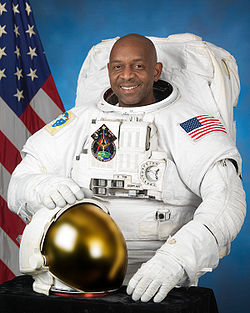Robert Satcher
| Robert Lee Satcher Jr. | |
 Robert Lee Satcher Jr. | |
| NASA-astronaut | |
|---|---|
| Född | 22 september 1965 Hampton, Virginia |
| Tid i rymden | 10 dagar, 19 timmar, 16 minuter |
| Urvalsgrupp | Astronautgrupp 19 |
| Antal rymdpromenader | 2 st |
| Rymdpromenadtid | 12 timmar, 19 minuter |
| Uppdrag | STS-129 |
| Uppdragsemblem | |
Robert Lee Satcher Jr., född 22 september 1965, är en amerikansk astronaut. Han blev uttagen till NASA:s astronautklass år 2004.
Familjeliv
Gift med D'Juanna White och har ett barn tillsammans.
Karriär
BSc i kemiteknik vid MIT, 1986.
PhD i kemiteknik vid MIT, 1993.
MD vid Harvard Medical School, Health Sciences and Technology Division, 1994.
Rymdfärder
Källor
”Biographical Data” (på engelska) (PDF). NASA. september 2011. https://www.nasa.gov/wp-content/uploads/2016/01/satcher_robert.pdf?emrc=9629ab. Läst 13 augusti 2024.
Media som används på denna webbplats
Astronaut Robert L. Satcher Jr., mission specialist
For STS-129 the sun shines brightly on the International Space Station (ISS) above and the United States below representing the bright future of U.S. human spaceflight. The contiguous U.S., Rocky Mountains, and Great Desert Southwest are clearly visible on the earth below encompassing all the NASA centers and the homes of the many dedicated people that work to make our Space Program possible. The integrated shapes of the patch signifying the two Express Logistics Carriers that will be delivered by STS-129 providing valuable equipment ensuring the longevity of the ISS. The Space Shuttle is vividly silhouetted by the sun highlighting how brightly the Orbiters have performed as a workhorse for the U.S. Space Program over the past 3 decades. The Space Shuttle ascends on the Astronaut symbol portrayed by the Red, White and Blue swoosh bounded by the gold halo. This symbol is worn with pride by this U.S. crew representing their country on STS-129. The names of the crew members are denoted on the outer band of the patch. As STS-129 launches, the Space Shuttle is in its twilight years. This fact is juxtaposed by the 13 stars on the patch which are symbolic of our children who are the future. The Moon and Mars feature predominantly to represent just how close humankind is to reaching further exploration of those heavenly bodies and how the current Space Shuttle and ISS missions are laying the essential ground work for those future endeavors.


